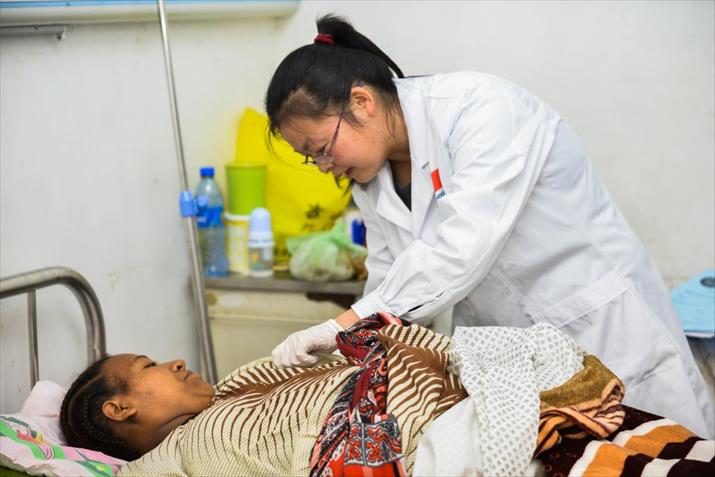|
||||||||||
| Home Nation World Business Opinion Lifestyle ChinAfrica Multimedia Columnists Documents Special Reports |
|
||||||||||
| Home Nation World Business Opinion Lifestyle ChinAfrica Multimedia Columnists Documents Special Reports |
| Africa |
| Enhancing Healthcare |
| Ethiopian hospital adds new trauma and childcare centers with Chinese assistance |
| By Kiram Tadesse | VOL.9 October 2017 ·2017-09-28 |

Tirunesh-Beijing Hospital is the pride of Addis Ababa. The state-of-the-art hospital in the Ethiopian capital is named after Tirunesh Dibaba, an Ethiopian female athlete who won two gold medals at the 2008 Beijing Olympics.
The hospital was built, with the support of the Chinese Government at a cost of $12.7 million, to promote Ethiopia-China friendship.
Since its inauguration in 2012, located around 20 km southeast of Addis Ababa, the hospital provides medical services to the population of Akaki-Kality sub-city and neighboring sub-cities as well as for other nearby towns in the Oromia Regional State. The hospital mainly offers outpatient, inpatient and emergency medical services. Tirunesh-Beijing Hospital also serves as a base for Chinese medical teams from Henan Province who come to the country to share their expertise.
In August 2017, two new centers were established at the hospital with the assistance of the Chinese Government. The opening of the Emergency and Trauma Treatment Center and Maternal and Child Health Care Center was held in the presence of diplomats and government officials from the two countries.
This June, the Ethiopian parliament approved a $13.8-billion budget for the new fiscal year, which began in August this year and ends in June 2018. The health sector is among the top six priority sectors in this new budget.
Chinese Ambassador to Ethiopia La Yifan said that the Ethiopian Government and its people have placed much emphasis on the development of their healthcare industry. He noted that the Chinese Government is always willing to contribute toward this healthcare focus in a modest way.
"Improving the health industry will not only improve the basic heathcare service of Ethiopia, but it will also improve the investment climate. The healthcare system is one of the basic elements considered when they [the Ethiopian Government] make decisions," said La.
The Ethiopian Government, by concentrating on the health sector, is not only contributing to the welfare of its people, but also keen to attract investors to build up the country and realize its Vision 2025 of becoming a middle-income country, he added.

Strategic intervention
In the past years, Ethiopian people's major health concern has been on communicable diseases with priority given to a health extension program in order to reach the community at the grassroot level. Today, non-communicable diseases (NCDs) are drawing greater attention in the country. Ethiopia is developing and implementing policies and strategies for the management of the main chronic NCDs. Road traffic accidents are also a public health burden.
The country has made intensive intervention and commendable improvements in the area of communicable diseases like malaria, tuberculosis, and HIV/AIDS, according to Dr. Jemal Adem, head of the Addis Ababa Health Bureau. However with the improvement of economic conditions and other factors, there has been a change in the demography and epidemiology of diseases in the country. The increase in the number of NCDs and road traffic accidents means this trend prompts Ethiopia to try to renovate existing hospitals as well as build new hospitals.
Tirunesh-Beijing Hospital plays a vital role in solving the gap between communicable and non-communicable diseases, Adem said. "The two newly established units will also play an indispensable role in adding value to society and the image of the hospital," he said.
A year ago, the hospital expanded to include traditional Chinese medicine (TCM). Despite limited access to TCM, it is well thought of in Ethiopia. Locals call the treatment "magic doctor" and "deity needle" and see it as a fast therapeutic treatment for most neuropathic or sciatica conditions.
People-to-people exchange
Tirunesh-Beijing Hospital is also considered as a fine example of the longstanding bilateral relations between Ethiopia and China. Ambassador La said China and Ethiopia are friendly countries with a multifaceted relationship, and the launching of the two centers will contribute to the people-to-people exchanges between the two.
Ethiopia is also benchmarking China's development model to reduce poverty, according to Dr. Kebede Worku, State Minister of Health. China's Henan Province began sending medical aid teams to Ethiopia in 1973. For over 43 years, 21 teams totaling 327 medical personnel were dispatched to four cities along with Ethiopian medical practitioners.
"We learn from each other and made mutual progress. By working together, we became brothers and sisters," said Li Guangsheng, Director General of Health and Family Planning Commission of Henan Province.
Li said, in the future, they will work hard to make better progress in order to fill the gap between what has been done and the expectations from their Ethiopian counterparts. The assignment of the Chinese medical teams for the last five decades has been instrumental in improving Ethiopia's health sector, said Worku.
Center of excellence
The Emergency and Trauma Treatment Center opened at Tirunesh-Beijing Hospital is said to be perfectly located at the southeastern part of the capital, which is the busiest corridor and a premium area for road traffic accidents. La said that his embassy placed great emphasis on the technology and the skills transfer at the hospital. Worku hopes the hospital could be transformed to include a comprehensive trauma center with a skilled trauma management team.
"Medical equipment is important in service delivery and their maintenance is also important," he said.
(Reporting from Ethiopia)
| About Us | Contact Us | Advertise with Us | Subscribe |
| Copyright Beijing Review All rights reserved 京ICP备08005356号-5 京公网安备110102005860号 |